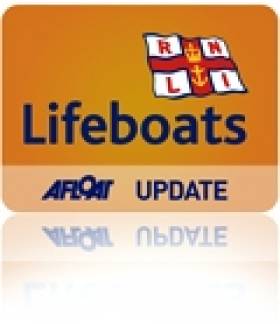Displaying items by tag: James Murphy
#RNLI - New Zealand man Greg Murphy and his wife Anne have made an emotional journey to Arklow RNLI to visit the lifeboat station where more than a century ago the lifeboat crew set out in heavy seas and torrential rain to save the life of his grandfather.
In 1897 James Murphy was just a teenager when the schooner he was on ran aground and he was saved by Arklow RNLI lifeboat crew.
The details of the call-out were recorded by then honorary secretary of the Arklow lifeboat, James Tyrell, and paint an extraordinary picture of a dramatic rescue which began at 9.45am on 28 March 1897.
James was on the schooner Express with his father, uncle and two crew en route to Wexford from Dublin when in strong winds and driving rain the vessel grounded off Arklow. The skipper was washed overboard and lost.
The Arklow lifeboat - Frances and Charlotte, a pulling and sailing lifeboat under the command of coxswain Richard Wadden - was launched and the lifeboat crew rowed through breaking seas to reach the stricken vessel.
The account goes on to detail how, on rounding the stern of the vessel, the lifeboat itself was filled by “a fearful sea” but emptied seconds later.
The hull of the schooner was under water when the lifeboat neared her and four crew members, including young James Murphy, were clinging to the rigging. In difficult conditions the lifeboat crew cast a line and secured it to the rigging with the plan to get the men to fasten themselves to the rope together and jump overboard.
However it is not known whether they did not hear or understand the instructions, but they only tied James to the rope and lowered him into the water.
He was hauled toward the lifeboat but there was not enough slack to get him onboard and the lifeboat crew shouted to the men to let him go or he would drown. They did so and the lifeboat crew recovered the boy onboard almost lifeless.
Tragically the stranded men had cast off the line and all contact with the wreck was severed. Attempts were made to again throw a line to the men but it was without success. Ultimately the mast went over into the sea, taking the men clinging to the rigging with it and they were lost. The lifeboat crew tried to recover them but were unsuccessful. It was to be the last callout for coxswain Wadden, who retired a short time later.
In subsequent months the Murphy family relocated to New Zealand. But they never forgot the story of the schooner Express and the actions of the Arklow lifeboat crew.
On visiting the lifeboat station more than 116 years later with his wife Anne and meeting with some of the present-day crew, Greg Murphy commented: “On behalf of myself and my very large family back in New Zealand, I want to say thank you for what you do.
"Without the bravery of the men of the Arklow lifeboat back in 1897 myself and my family simply would not exist. Thank you all so very much.”






























































